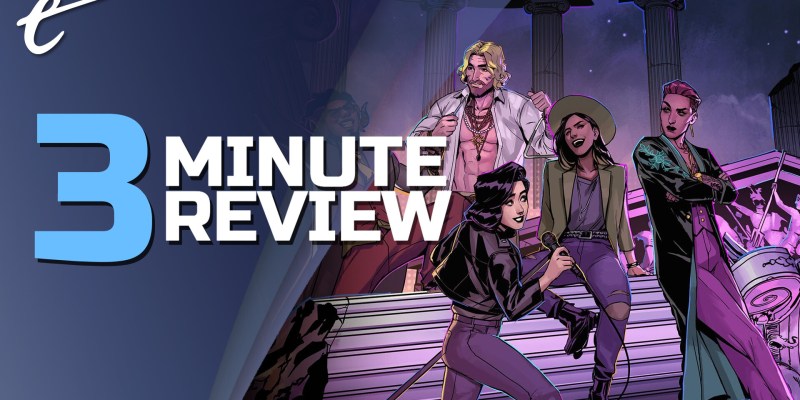Stray Gods: The Roleplaying Musical is a visual novel where most of the important choices take place during song. Here’s our Stray Gods review.
You play as Grace, an adrift twenty-something who becomes a Muse after one dies in her arms. When the other Greek gods suspect you of murder, you’re given a week to prove your innocence using your power to influence people through song.
You go to a location via the map, talk to some people and make some choices, then get into a musical number in which your choices affect both the music and the outcome. As in most musicals, the songs tend to contain the most emotional and conflicted moments of the story, and as such give you the biggest choices to make.
The choose your own adventure musical numbers are a complicated balancing act between the art, composition, voice acting, singing, and writing, and I’m glad to say the game nails it. While poorly written musicals can become overly superficial, the writing has a tenderness to it. Laura Bailey, who plays Grace, heads up a cast that both sings and voice acts so well that the characters feel real, and the music is well performed and composed. The animated comic-style art really worked for me, and while it’s not as full of movement as most musicals, the use of blocking, color and facial expressions keep the visuals impactful.
The musical scenes focus on character conflict – you want something from someone, and must convince them, for example – and the game balances strong consequences for your decisions and a sense of playfulness. You aren’t likely to screw up a song because you make one bad decision, and you basically can’t die, meaning you can feel your way through the choices. The songs aren’t overly long, and your decisions often do impact the outcome of the story, so they continue to feel special throughout the game’s runtime.
A large part of your enjoyment of the game will depend on your buy-in to the musical aspect. This is a choice and consequence game in the vein of Life is Strange, but instead of puzzles to solve and areas to walk around, the musical numbers with choices are the big set pieces here. I come at this as a musician who generally likes musicals, and to me the songs felt well integrated into the story. I was never wishing a song would be over so the story could continue; the songs are the story as much as the dialogue.
This does mean that Stray Gods functions on a more emotional level than most choice-based games. You’re encouraged to feel what the characters feel through the music, and to put yourself in Grace’s shoes, but if you don’t connect to the music emotionally, it could fall flat for you.
The game does sometimes hit up against the limits of song-based branching dialogue. At one point a character accused me of not asking them before doing something, but that wasn’t a choice I made, it was because the song was ending and I had to pick one of two options. People really do get caught up in the moment and make emotional decisions, but I was also railroaded into a decision too soon.
Overall the game takes a somber, but playful tone, which sounds weird but totally works. Issues like torture, war, loss, and suicide are addressed emotionally and thoughtfully, and the characters also get to make jokes.
The question with Stray Gods was always whether it would pull off its musical roleplaying premise, and it does so. The game’s only 6 or so hours long, but that time is awesome. There’s no other game like this one, and if you’re willing to give yourself over to the music, give it a try.
Stray Gods: The Roleplaying Musical releases August 10 for Nintendo Switch, PlayStation 4, PlayStation 5, Xbox One, Xbox Series X/S and PC.
Check out the rest of our 3 Minute Reviews here.
